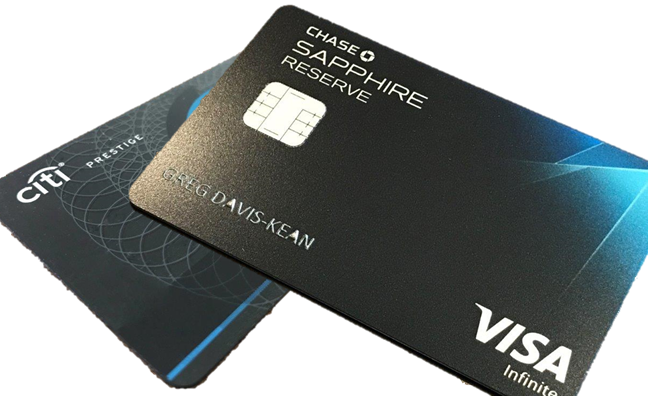NOTICE: This post references card features that have changed, expired, or are not currently available

Recently I posted news about big changes coming to the Citi Prestige card as of January 2019: Citi Prestige to add 5X dining & airfare; limit 4th Night Free. In response, some readers asked if this marked the end for the Chase Sapphire Reserve. Others asked whether Chase will respond by increasing the Sapphire Reserve’s category bonuses. After all, while the Sapphire Reserve offers “only” 3X for dining and travel, the new Prestige card will offer 5X for dining and certain travel (airfare & most travel agencies).
My quick answer: No, I don’t think Chase has much to fear.
The following table shows Sapphire Reserve & new Citi Prestige fees & benefits side by side. The Prestige card isn’t currently available for new cardholders, but it is expected to re-launch in January 2019. See my earlier post for details about when each Prestige feature changes to the new structure.
| Chase Sapphire Reserve | New Citi Prestige | |
|---|---|---|
| Annual Fee | $ |
$495 ($350 with CitiGold Checking) |
| Travel Credit | $300 per year | $250 per year |
| Net Cost After Travel Credits | $150 | $245 (or $100 with CitiGold Checking) |
| Authorized User Fee | $75 | $50 |
| Bonus Categories | 3X travel & dining | 5X airfare, dining, and most travel agencies 3X hotels and cruise lines |
| Point Value | 1 cent per point for cash 1.5 cents per point for travel booked through Ultimate Rewards |
1 cent per point for cash (1.25 cents per point for travel booked through the Citi ThankYou portal with the Citi Premier card) |
| 4th Night Free Benefit | N/A | Twice per calendar year: Book 4 hotel nights for the price of 3 (details here). |
| Cell Phone Protection | N/A | Covers damage & theft |
| Lounge Access | Priority Pass Select with 2 guests | Priority Pass Select with 2 guests or immediate family, plus Citi Proprietary Lounges (last I heard there were 4 of these) |
| Global Entry Fee Credit | $100 | $100 |
| Travel Insurance | Best in-class | Almost as good as Sapphire Reserve (details here) |
| Missed Event Ticket Protection | N/A | Reimburses up to $500 per ticket ($5K per year) if “the unexpected keeps you from using tickets” |
| Price protection | N/A | Covers price drop within 60 days up to $200 per claim, $1K per year |
6 reasons the Prestige is not a Sapphire Reserve killer
- Annual Fee: As of January 2020, the Sapphire Reserve’s newly increased annual fee of $550 is higher than the Prestige’s $495. Those who are grandfathered into the $350 annual fee will obviously do better with the Prestige (price-wise) — though that is expected to end at next annual fee, with all Prestige cardholders who do not have Citigold paying the $495 fee.
- Travel Rebate: The Sapphire Reserve offers $50 more per year than the Prestige ($300 vs. $250).
- Travel Point Bonuses: With dining, the Prestige has a clear advantage over the Sapphire Reserve: 5X beats 3X. With travel, though, things get murky. Chase defines travel broadly and offers 3X for all of it. With the Prestige card, you get 5X only for airfare and “most travel agencies.” This latter part requires some explanation: often when you go through a travel agency, you don’t pay them at all. Instead, they get a kickback when you pay the hotel, cruise-line, etc. In those cases, Citi won’t know that you went through a travel agency and you won’t earn 5X. With Citi, the only way to be sure to get a good multiple on all travel is with the $95 Premier card which offers 3X for travel & gas. That’s great, but then you’ve increased complexity and annual fees to get to a better solution than with the Sapphire Reserve.
- Point Value: Sapphire Reserve points are worth more than Prestige points (1.5 cents per point towards travel vs. 1 cent per point). Even if you pair the Prestige card with the Citi Premier card, the best you can get is 1.25 cents value towards travel.
- Transfer Partners: Both programs offer the ability to transfer points to airline miles & hotel programs, but Chase’s partners are arguably better for most people. Examples of easy-to-use transfer partners that Chase has but Citi does not include: Hyatt, United, and Southwest.
- Companion Cards: In my mind, this is the number one reason that the Sapphire Reserve is safe. More on this below…
Companion Cards
With Chase, there are many options for earning Ultimate Rewards points at high multiples, and many of these are fee free. In each case you can earn points with the fee-free card and move those points to the Sapphire Reserve to get better value:
- Chase Freedom Unlimited: 1.5X everywhere
- Chase Ink Business Unlimited: 1.5X everywhere
- Chase Freedom: 5X rotating categories
- Chase Ink Business Cash: 5X office supply, cell phone, internet
- Chase Ink Business Preferred ($95/year): 3X travel, shipping, internet, cable, phone, and advertising with social media sites
Citi, meanwhile, offers these companion cards:
- Citi Premier ($95/year): 3X travel & gas; 2X dining & entertainment
- AT&T Access (no fee): 2X online retail and travel
- AT&T Access More ($95/year): 3X online retail and travel [This card is no longer available for new signups]
- ThankYou Preferred (no fee): 2X dining & entertainment
- CitiBusiness ThankYou (no fee): 3X rotating categories.
At the low end, Chase makes it easy to earn at least 1.5 points per dollar for all spend. Surprisingly, Citi doesn’t offer any ThankYou cards that earn more than 1 point per dollar for non-bonus spend.
At the high end (5X), Chase offers multiple companion cards that make it possible to get 5X rewards when buying gift cards. For example, it is easy to go in-store or online to Staples to buy gift cards to other stores. Since the transactions are processed by Staples, you would get 5 points per dollar when paying with your Ink Business Cash card. Similarly, the Freedom card often offers 5X at places that sell gift cards: grocery stores, drugstores, gas stations, warehouse stores, etc. By buying gift cards in this way, it’s possible to extend 5X earnings far beyond the specific categories supported by these cards.
Bottom Line
Even with the Citi Prestige card’s new 5X categories, I believe the Sapphire Reserve is still the better all-around travel card. Chase’s annual fee is lower and its travel rebate is higher. Chase offers more ways to earn more points and lets you redeem those points for more value. Taken together, this means that your rebate from spend with Chase is at least 2.25% towards travel: you can earn a minimum of 1.5 points per dollar on all spend (with the Freedom Unlimited or Ink Business Unlimited card) and redeem for 1.5 cents per point with the Sapphire Reserve. With Citi, your rebate from unbonused spend is just 1%.
So, for those who want to keep things relatively simple and to work within a single rewards scheme, I believe that Chase has the better hand. Nothing about the new Prestige benefits has led me to change my preferred card combos that I detailed in a recent post: Super credit card combos.
That said, if you’re willing to go to the next level of complexity by using cards across multiple rewards programs (see: Super mixed credit card combo), the new Citi Prestige may be just good enough to convince me to replace the Sapphire Reserve with the $95 Chase Ink Business Preferred (which also offers 3X for travel). Look for more about this topic in a future post…





[…] people would be better off with the Sapphire Reserve if they had to pick one or the other (see: 6 reasons the Citi Prestige is not a Sapphire Reserve killer), but I think that the Prestige is the better card for me (given that I have other cards that […]
Well, I currently have both the Chase and CITI cards. This was the best comparison I have seen online but here are some other fine points that were not covered. Chase doe NOT provide fare to return you home if your trip is interrupted, so Chase is NOT best in class. CITI limits trip cancellation to $5k per person. Here is what I recently did since I have both cards – booked the beach vacation house for my extended family which was over $5k so I used CSR which has a $10k limit (Chase customer service also indicated they would count it as travel where CITI would not) and booked my flights with CITI because of the superior trip interruption benefit.
Lastly, CITI has a far better extended warranty protection program that can add 2 years beyond an extended warranty. If I were buying appliances or such in the near future I would go with CITI.
By the way, you would have to spend about $5k combined on Air Fare and Restaurants per year in order for the net fee differences to equal out between the cards. More than $5 it tilts to CITI, less than $5k tilts towards CSR in terms of fee alone. I am valuing the points as equal so let’s not get into which points are most valuable.
Now, I plan to get rid of one of the cards in the summer of 2019, but which one?
Under your scenario you would not have received coverage for your beach house because you did not use your CSR to purchase your airline ticket.
I will cancel the Prestige in June after I receive my last 4th night free credit. Not being able to book 4th night free reservations through the Concierge after 09/01/19 kills it for me. I have had the Prestige since 2015. So tired of the yearly devaluations to the card. So sick of Citi. I may even cancel my Double Cash card.
Who ever claimed Citi Prestige was out to “kill” the CSR? Who said it was an either/or situation? (This is the first I’ve ever heard that.) “One size fits all” is one of the Great Lies of the Western World. For some, Citi Prestige may work out better; for some, the CSR is better; and for others, having both is the ideal situation.
Let’s not forget Chase’s *severe* restrictions on the CSR. You cannot hold both the CSP and CSR at the same time. 5/24 applies. You cannot get a sign-up bonus unless you have NOT had a Sapphire card in what, 48 months? And so on and so on and so on… There are people who, like me, were caught in the “vortex” — I was over 5/24 when Chase first introduced the CSR. (Ironically, my 5th card was the Citi Prestige.) I thus missed out on their original 100k sign-up bonus…and even the 50k bonus. Now that Chase has once again changed the rules, my only options are to upgrade the CSP to the CSR (w/zero sign-up bonus), OR downgrade the CSP to a Freedom card (so as not to lose my UR points), wait the four years, and then apply for the CSR. No thank you; that’s not an option.
You forgot Citi Price Rewind. I’ve saved hundreds of $$ this past year through Rewind claims made on purchases from the Citi Prestige.
I think the best is having citi prestige and the Ink preferred. The ink is where you book all your travel except airlines and you still have the possibility of transfering miles and afaik, you also have primary car insurance. The Prestige for dining and flights. The amex 2x business card for all us not bonus spend. No other annual fee card required unless you want the ones with an annual hotel night
I’ll like to see an article on canceling the CSR and just keeping the ink preferred instead
My plan is similar with some tweaks since I travel a lot internationally. Would appreciate yours and other readers thoughts on this:
Citi prestige: Dining & Flights (5x TY)
Ink Preferred: Travel (Hotels, Car rental, Train, Taxi, Uber, etc.) (3x UR)
Amex blue business (no fee): non-bonus US (2x MR)
Capital One Quicksilver (no fee): non-bonus international (1.5% cash back)
And….
Amex SPG luxury for annual free night certificate (50k points)
I would like to hear your strategy for which card to use when booking “expensive travel”, like safaris, cruises, and guided tours that cost, say, $5K+ . In these cases, the benefit associated with a particular card can outweigh the points earning potential. In my (limited) experience, the best combination of cards to use for a big travel purchase is CSR (or it cousin, Chase Ritz, which is what I actually have and you neglect to mention in this article) and Prestige TOGETHER. IOW, I charge part of the transaction to Ritz in order to trigger coverages and then use the Prestige because the points earning benefits are better than the Ritz card.
I have the other premium cards too but their coverage is not at all useful. (The exception is Amex Plats Emergency Evac, which I dont even have to use the card for in order to use)
I’d love to hear your take on this question of which cards to use for such travel (and, specifically, if you think a 2 card split payment approach using Ritz/CSR and Prestige is the best way to go)
For big purchases, I’d rather put all or most of the spend on a single card such as Prestige or CSR (you’re right that the Ritz has equal travel insurance, but it seemed besides the point for the angle of this article). The reason is that even though they say that you only have to pay partial in order to get full coverage, I’m not confident that they’ll do so without a fight. In your case, the decision is harder: a) split the spend or b) pick a lesser insurance or c) pick better insurance but with fewer rewards. I’d probably go with (a) too in that case.
The one time I had to use Prestige for lost luggage guarantee, it was an award ticket and I had only paid taxes. Not sure if this qualifies as “partial” or “full” (I paid all the taxes on this card), but it was a painless process.
In fact, at the risk of sounding like a shill, I’ve found the Citi insurance to be pretty good so far. (used it also on a few price matches).
Sounds like doing the split spend is also what you recommend…thanks!
Very useful. Thank you.
There’s room for both cards.. With Citi, however, you can be net positive on the fees, and they offer spending bonuses, and transfer bonuses to airlines, and their customer service on the Prestige, imo, is stellar. When things don’t code correctly, they use their judgment rather than insisting that’s what the merchant code is. These intangibles don’t make your list however. If you are transferring for international business class, the 1.5 on the chase portal is somewhat moot (though nice to have as a floor for your points). Also, chase needs to add partners to remain competitive – they are coasting on their United relationship.
Spoken like a true non-foodie. Detroit has great Lebanese restaurants. Go try some with your Citi!
I didn’t say that the Prestige didn’t win me over… just that it didn’t kill the CSR. Big difference!
Why are Chase’s transfer partners arguably better (after Korean left)? Singapore, Airfrance and Virgin overlap for both….. Hyatt is nice, but Avianca (via Citi) award chart is generally more favorable for booking star alliance than United’s (Chase) after recent improvements to the website make booking painless. I’d value Cathay/Etihad similiarly to BA Avios
I’d only think United is more valuable if you live in a United hub and fly their own metal a lot (meaning generate a lot of your points by flying, not just CC spend).
Hyatt is more than nice. At least for some of us. Okay, at least for me. And with C+P dying next week, Hyatt points becoming even more valuable. At least for some of us. Okay, ….
Sure… Hyatt is the most valuable Chase partner now and in theory I’ll try to use my pts for Hyatt stays with good value (Just redeemed 100k pts for 4 nights at Andaz Tokyo next month).
will i ACTUALLY use them all on Hyatt? Since Hyatt’s footprint of hotels is small (esp Europe) I might go on several trips before a Hyatt is my top option, so I might end up using for a Biz flight instead, but I try and redeem Citi/Amex for the Biz flight awards whenever possible.
My point was that while Chase has easily the best hotel partner, I dont think the Chase AIRLINE partners are BETTER than Amex or Citi’s (after Korean left Chase). I think they once were, but now are basically tied (same as Lucky from OMAAT).
I think most people are simply used to using the big 3 US airline programs so they assume having one (United) is better than not having any (for Citi). That’s certainly reasonable for the non-hobbyist, but if you know how to use Aeroplan, Avianca, etc I’d argue you get at least equal value as United.
The point of the post was that the Sapphire Reserve isn’t killed for the average traveler. In my experience, most average travelers aren’t going to transfer points at all, but will book travel through the Chase portal. If they do transfer points, they’ll want to go with an airline (or hotel in the Hyatt example) that makes redeeming miles easy and intuitive. United and Southwest both fit the bill in that way (JetBlue too, but Citi has that as well).
I think you have to look a little deeper to call the Chase travel insurance best in class as I recently learned the hard way, Chase does not pay for the increased airfare when you have to fly home early due to a covered reason for trip interruption. Citi does at least up to the amount that you paid for the travel on that card originally. We had to pay over $600 when we changed our return flight after I broke my shoulder on vacation last month. That seems to be a critical and obvious cost of a trip interruption. I’m not sure yet whether we will be successful in getting any reimbursement for our cancelled Airbnb either. Time will tell.
Thanks for this info. I’ve heard something similar from at least one other person. On the other hand, I’ve also heard reports where the opposite is true: where Citi’s insurance won’t cover things that Chase’s will. I’m not sure that there’s any good way to do a true apples to apples comparison outside of what is written in their benefits guides.
I have the prestige and for now, have no intention of dropping it. The fourth night free means it should be a keeper.
And then of course there’s Turkish Airlines. Of which Citi is a transfer partner. You wanna fly to Europe in business class the righ wayt? Turkish. Yes you can book thru UAL and star alliance, but you’ll use waaaaaaaaay more points.
So I’m keeping mine….just not spending a lot on it tho.
When booking partners doesn’t the Turkish program require you to go in person to a ticket office to ticket your awards?
Well….upon further review….I just did my homework.
I did a practice booking….
Boston to Istanbul January 16-February 11 RT
Bos to IST on UAL Star Alliance RT is 140K miles non stop. That’s flying Turkish Airlines. Taxes $37.33
Same flight booked thru Turkish Airlines….90K miles BUT $420 in taxes/fees.
Gulp.
Spend $400 to save 50K miles… That’s like buying miles at 0.8 cents each. Not bad.
Booking Turkish Airlines flights online is apparently not a huge deal. Partner flights tho must be booked at ticket offices.
https://onemileatatime.com/turkish-award-sweet-spots/
I used the 4th night free probably 15 times a year the last couple of years…so a big hit bit I still like the Prestige Card even with the changes. The CSR Card was “King of the Hill” but it is a little tarnished now…lost Korean, Hyatt devalued on Cash + Points, Amex Gold better on restaurants, and now the Prestige 5x restaurant. I could do just fine with Citi and Amex.
The number 1 reason the Citi Prestige is not a Chase Sapphire killer for me is domestic primary rental car coverage. Citi Prestige is only primary internationally. This benefit is available on the Chase Sapphire Preferred as well, so I may drop down from the CSR.